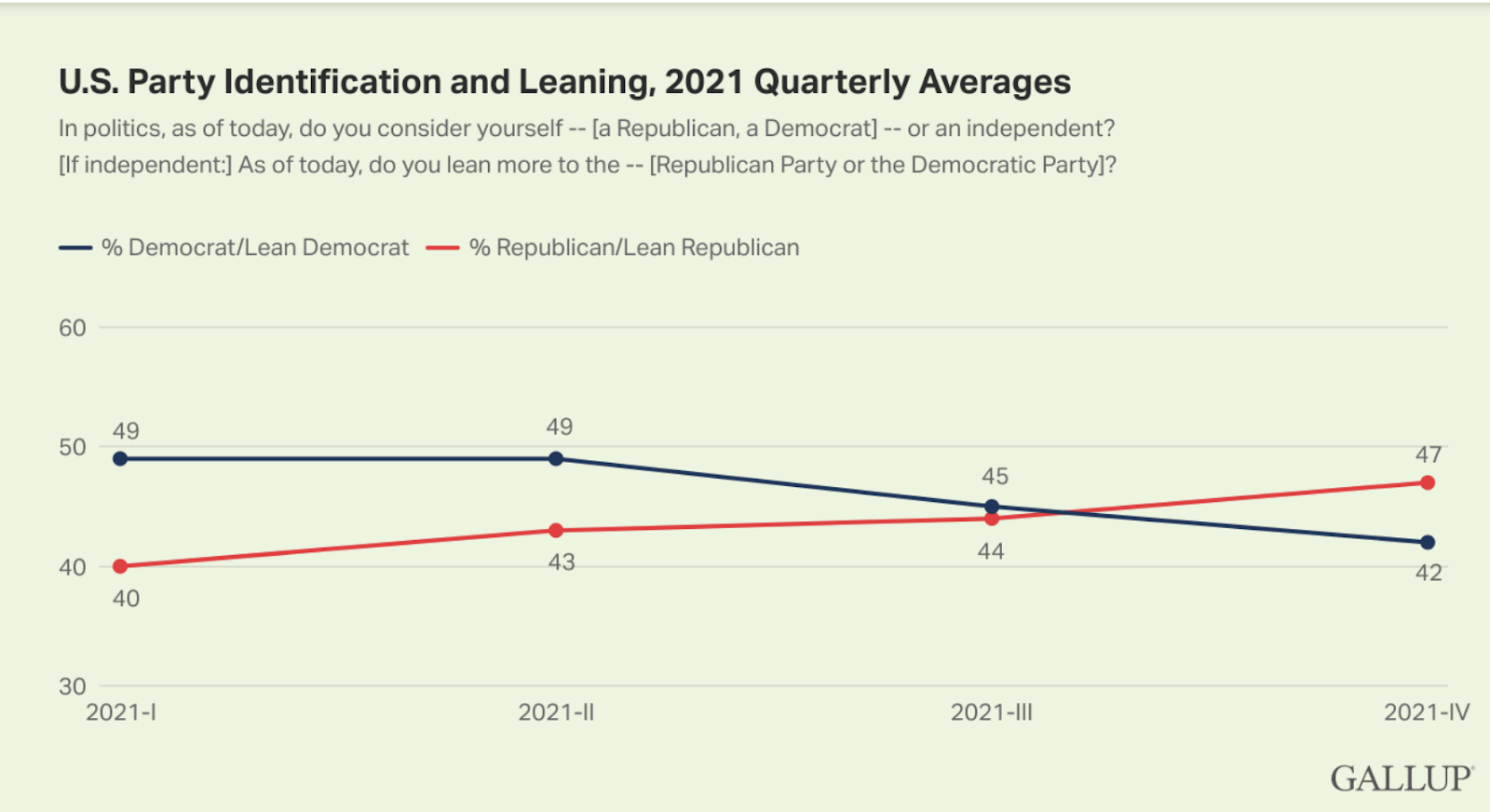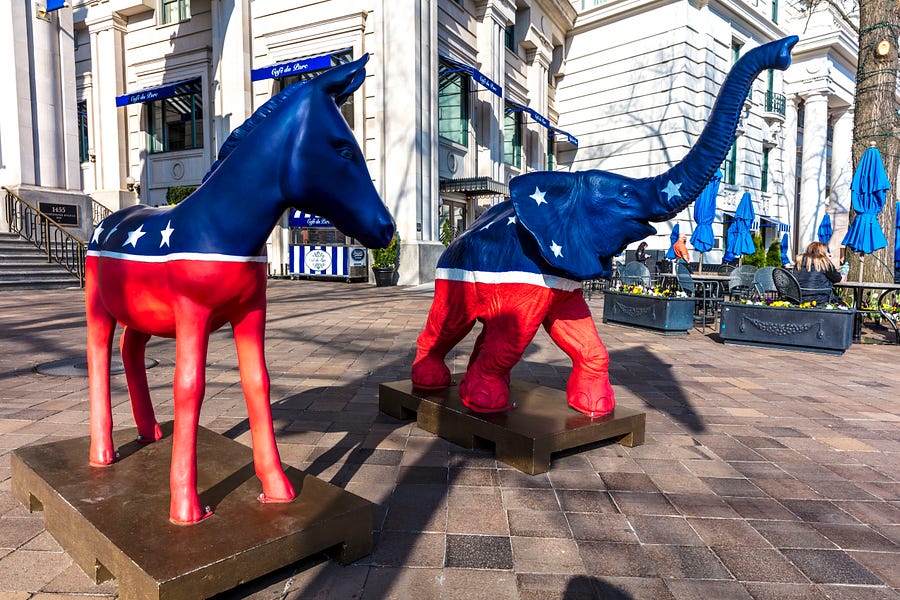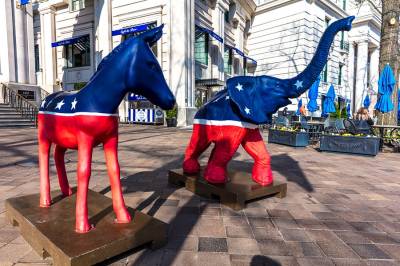Campaign Quick Hits
Well, Let Me Get to The Point: Gary Chambers is running for the U.S. Senate in Louisiana. It’ll be an uphill climb against incumbent Sen. John Kennedy even if Chambers wins the Democratic primary, so perhaps he thought he needed a little help from mary jane. That’s right, he’s smoking marijuana in his ad. All jokes aside, I think it’s a well-produced, smart ad. He’s wearing a suit sitting in a big leather chair outside with a cigar-sized blunt and a rifle shot message: “Every 37 seconds someone is arrested for possession of marijuana. … Most of the people police are arresting aren’t dealers, but rather people with small amounts of pot. Just like me.” I don’t agree with a lot of decriminalization advocacy, and this guy isn’t going to be the next senator from Louisiana, but I think it's a brilliant campaign ad.
Crypto in the Midterms: Here’s a fun read from Ben Schreckinger at Politico on why candidates from all sides are embracing cryptocurrency for 2022. The newly formed Congressional Blockchain Caucus has 18 Republican members and 17 Democrats. But there’s bipartisan opposition, too—Donald Trump and Hillary Clinton have finally found an issue they can agree on.
The Politics of Voting Rights: It turns out the White House never even reached out to Republican Sen. Mitt Romney to talk about the voting rights legislation that the administration has pitched as a crossroads between good and evil. On the one hand, Romney told HuffPost’s Igor Bobic back in March that he didn’t support the original House version. So maybe they thought it was a nonstarter. But on the other hand, are you kidding me? If you know you don’t have the votes to get past the filibuster in your own party and you really meant everything you’d said about needing voting reforms to protect democracy against the Trump hordes, there is no road that doesn’t lead through Mitt Romney. So why not pick up the phone and take his temperature on what changes he might be willing to support?
Given how obvious this is, it’s hard to chalk this up to White House incompetence. Whatever you may think of Biden’s team (and I actually think very highly of several people who work in the West Wing), they can count to 60. So what explains it? I hate to say this because I really don’t like what it says about where their heads are at, but it looks to me like an administration far more interested in finding a wedge issue for the midterms than getting any legislation through Congress.
But will it work? Alex Samuels at FiveThirtyEight breaks it down. Sure, “even if Democrats aren’t able to pass voting rights legislation, they can at least establish themselves as the party in favor of democracy and voting rights.” Then again, “the party risks looking feckless, if not useless, if they cannot deliver.”
Gettin’ Testy Down in Tallahassee: Multiple outlets are reporting on tensions between once and future presidential candidates Donald Trump and Florida Gov. Ron DeSantis. At Axios, Jonathan Swan wrote that Trump views DeSantis as “an ingrate with a ‘dull personality’ and no realistic chance of beating him in a potential 2024 showdown.” So what’s eating Gilbert Grape? For starters, DeSantis has refused to rule out running against Trump—if Trump chooses to run—in 2024. “The magic words,” according to Trump.
This, perhaps, is why Trump took a veiled shot at DeSantis last month when Trump talked about politicians (like DeSantis) who won’t say whether they’ve gotten a booster shot, saying, “The answer is ‘Yes,’ but they don’t want to say it, because they’re gutless.” But DeSantis turned up the heat last week, when he went on the popular conservative podcast Ruthless and said that “one of his biggest regrets in office was not speaking out ‘much louder’ in March 2020, when Trump advised the American public to stay home to slow the spread of the coronavirus.”
All of this matters, of course, because I think the whole field could shift pretty dramatically if DeSantis chooses to run against Trump. Even though—as 2016 proved—Trump would be far more vulnerable in a one-on-one primary, DeSantis getting in would prove too tempting to the other sharks who smell blood in the water. DeSantis bows out, Trump looks strong. DeSantis gets in, Trump looks weaker and a bunch of other candidates (Cruz, Cotton, Abbott, Pompeo) decide to jump in … making Trump’s chances of winning much higher. It’s ironic, I know.
Oh Carolina: North Carolina gained a congressional seat with the 2020 census, but its redistricting map is facing a legal challenge even as 2022 midterm primaries draw near. Meanwhile, Rep. Madison Cawthorn has announced that he’ll run not from the district in which he serves now (what was the 11th District and is now the 14th) but instead from the new 13th District, which is closer to the Charlotte media market. What gives? Andrew gets to the bottom of it all.
Galluping to a New Party ID
Looking at which political parties’ Americans identify with, Gallup recently noted “a dramatic shift over the course of 2021, from a nine-percentage-point Democratic advantage in the first quarter to a rare five-point Republican edge in the fourth quarter.” It’s the largest swing since Gallup started asking the question in 1991.

I thought Nate Silver had the best read on this data: “So, pick your hypothesis: 1) Party ID is very stable, so big shifts reflect nonresponse bias; 2) Party ID is usually fairly stable, so a big shift like this is really bad for Ds; 3) Party ID isn't that stable, so this doesn't tell us any more than e.g. shifts in Biden approval.
I think he’s exactly right so let me break this down a little bit. This data is collected from 12,000 randomly sampled U.S. adults.
Hypothesis One: Voters’ party ID is like their religion. Someone may change religions but it’s rare because it’s part of his or her identity and the effect you’d see in the data would be gradual. So what to make of this 2021 drama in the data? In short, it’s bad data.
When Biden takes office and they control both houses of Congress, Democrats are feeling good and happy to shout it from the rooftops. But a year later, Democrats are depressed because, well, look around. That makes them less likely to want to engage in fun chit chat with a pollster, so they say they’re in the middle of cooking dinner or whatever to get off the phone. The result is that Gallup is surveying the same types of people over the course of the year but the willingness of those same types to talk to Gallup changed over time—or it’s just random because responses are so low anyway. Either way, what you’d see in the data are big shifts that aren’t there in reality, meaning both parties should ignore this poll question and that party ID is the same as it’s ever been.
Hypothesis Two: Voters’ party ID is like their brand loyalty. People generally are Pepsi drinkers or Coke drinkers. Trying to get them to switch is the lifelong goal of each brand, but it’s a hard climb. So if suddenly there’s a run on Pepsi at every grocery store in the country, that would be weird but it would also be very, very bad news for Coke. And if it turns out that in the previous four months, there’d been a bunch of new stories about people finding cockroaches in their Coke cans, that would suggest that these people have left the Coke brand for a reason and that—given the stickiness of brand loyalty overall—they probably aren’t coming back.
So what to make of the data under this hypothesis? It’s good data and very bad news for Democrats.
Democrats’ brand has been so degraded—and so quickly degraded—in the last four months of the Biden administration because of inflation, COVID, schools, immigration, you name it that we are seeing big jumps in people’s party ID. And those people who have moved from identifying as Democrats to identifying as Republicans in the past year are unlikely to switch back.
So what we are seeing in the data is real, it’s bad for Democrats, and there’s nothing they can do about it.
Hypothesis Three: A voter’s party ID is like being a Dallas Cowboys fan. People say they’re Cowboys fans when the Cowboys are winning. So if you try to measure how many Cowboys fans are out there, whatever number you get will be largely worthless because it’s actually just a proxy for another number: Did the Cowboys win last night? (Sorry, producer Caleb.)
This would mean that whether people say they are Democrats is just another way of asking them if they like Joe Biden. So as we saw Biden’s approval numbers hit the skids, so, too, did we see the party ID numbers drop off as well. If true, this means that party ID numbers are pointless to measure because they are just a different way of asking whether the person likes the president. Maybe having another measure of the president’s popularity is helpful for certain reasons (e.g., there are people who disapprove of Biden as not liberal enough but still identify as Democrats and are still going to vote for their progressive House member), but nothing in this data should shake anyone’s core understanding of the American electorate.
In this case, what we are seeing in the data is real, it’s bad for Democrats, but it’s temporary until they can get out of the news cycle from hell.
And what do I think is actually the right explanation? I think we’re seeing an unusual combo of the second and third hypotheses that both happen to be pushing in the same direction at the same time. I don’t see how anyone can look hard at the 2016 and 2020 data and not see a party realignment happening—around education if nothing else. White, non-college educated voters are leaving the Democrat Party the way that the South switched teams in the 1980s. That’s a Hypothesis Two shift—party ID is relatively stable so if you’re seeing it move, that is meaningful.
But I don’t think that can account for such a big and sudden shift. More likely Hypothesis Two is the wind in the sails of Hypothesis Three—some middle-of-the-road voters were repulsed by Trump and are now deeply disappointed in Biden’s presidency. So their partisan identity is more transient right now because the parties have become more extreme.
What does this mean for Democrats? It’s not good no matter which way you slice it. If I’m right, they’ve got some structural problems they can’t fix and some temporary problems they could fix. But it’ll be very hard to fix any of it before the 2022 midterms. If I’m wrong, it’s still not good news for them. Even if it’s Hypothesis One—a nonresponse bias that is creating noise in the polling data—I still think that could be a sign of the challenge Democrats will face with their voter turnout efforts. If a pollster is suddenly having trouble reaching your voters, why do you think your ground game will have any more luck?
The RNC Kills the CPD
From Maggie Haberman at the New York Times, “the Republican National Committee is preparing to change its rules to require presidential candidates seeking the party’s nomination to sign a pledge to not participate in any debates sponsored by the Commission on Presidential Debates.”
The headlines made this sound a little like the Republicans took their ball and went home because Donald Trump doesn’t like debates. But I think it’s a little more interesting than that.
First, a quick history. We all know about the Kennedy-Nixon debates in 1960. No presidential debates were held in 1964. Nixon then refused to participate in debates in 1968 and 1972. The League of Women Voters sponsored debates in 1976, 1980, and 1984, but everyone thought they were a slapdash mess because “the leading candidates had often declined to debate or resisted debates until the last minute.” In response, the CPD was created in 1987 by chairmen of the RNC and DNC who agreed to the creation of an independent commission that they themselves chaired, which means it has sponsored debates in nine cycles.
So what’s the beef? Here’s what RNC Chairwoman Ronna McDaniel said in defense of the move:
The Commission [on Presidential Debates] had no interest in working with the Republican Party which represents 74 million voters. And what they've done is they've set up a system where 'we'll only work with the nominee,' but by the time the nominee is in place, which is after the Convention and 2024, the debates are all set. So they [the CPD] have total control and a total monopoly. There were three things that were really egregious in 2020: they picked a moderator that worked for Joe Biden, they started debates after a million votes had been cast - we asked them to start debates before early voting starts - and then I think the third is members of their commission were vocally disparaging the Republican candidate and were allowed to stay in their roles - so this has been a cushy job for decades. They have a total monopoly and we said, 'Can you just guarantee us that you won't pick a moderator who worked for the Democrat candidate?' They won’t even say yes to that.
So the RNC wanted the CPD 1) to work with the RNC in the months before a nominee was selected, 2) to start debates before early voting began, and 3) to bar members of the CPD from partisan politics while they serve on the commission. I’m less convinced of the first one, but the second two seem like no-brainers.
It’s important to note that the CPD has nothing to do with primary debates. In fact, it was the RNC that controlled the GOP primary debate process in 2016 … and it was a debacle. I expect something similar will happen moving forward except instead of herding cats from the same party, the RNC and DNC will have to coordinate directly with one another on debate format, timing, moderators, etc. Oh, does that not sound like something that’s going to work out well in 2024? I think you’re right.
So maybe the RNC didn’t so much take its ball as it let all the air out, took the nozzle, and left the deflated mess lying there as a warning for all to see.







Please note that we at The Dispatch hold ourselves, our work, and our commenters to a higher standard than other places on the internet. We welcome comments that foster genuine debate or discussion—including comments critical of us or our work—but responses that include ad hominem attacks on fellow Dispatch members or are intended to stoke fear and anger may be moderated.
With your membership, you only have the ability to comment on The Morning Dispatch articles. Consider upgrading to join the conversation everywhere.